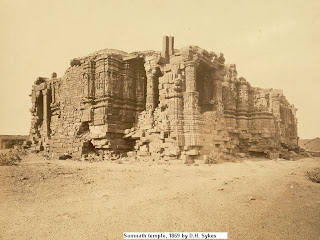
The history of Gujarat, the western most state of India, goes back to 2000 B.C. Tradition has it that Lord Krishna left Mathura to settle on the west coast of Saurashtra, which later became famous as Dwarka, a well-known city in the state.
Two important Indus Valley Civilisation sites in Gujarat are Lothal and Dholavira.
The area that constitutes the present day Gujarat was ruled by various dynasties including Mauryas, Guptas, Pratiharas and others.
During the time of Chalukya dynasty, Gujarat saw progress and prosperity. the Chalukya or Solankis ruled in Gujarat and Kathiawar for nearly three centuries and half (950-1300). One of the earliest rulers of this dynasty was Mularaja who consolidated the Chalukya power in Gujarat. The next illustrious king was Bhima I (1022-64), during whose reign Mahmud Ghazni overran Gujarat and plundered the great temple of Somanath.
Jayasimha Siddharaja was the greatest Chalukya king who, in commemoration of his victory against the Paramaras, adopted the title of Avantinatha. During the reign of Bhima II (1178-1241), Muhammad Ghori made an unsuccessful attempt to subjugate Gujarat in 1178 AD. Anhilwara was plundered by the Turkish army. In the same period the Vagela chief craved out an independent principality in Gujarat between the Sabarmati and the Narmada. Gujarat was annexed into the Delhi sultanate by Allauddin Khilji. The state was incorporated into the Mughal emperor Akbar in 1576.
After coming under the control of the Portuguese, Gujarat was ruled by the British who set up a factory in Surat in 1614. Gujarat finds a place of pride during the independence movement thanks to producing Mahatma Gandhi, father of the nation. Apart from Mahatma Gandhi, Sardar Vallabhbhai Patel was another stalwart of India’s struggle for freedom.
The present state of Gujarat came into being on 1 May 1960 thanks to the bifurcation of Bombay state. Maharashtra became the other state. Gandhinagar became the capital of the state in 1970. Earlier the capital was Ahmedabad.
Comments
Post a Comment